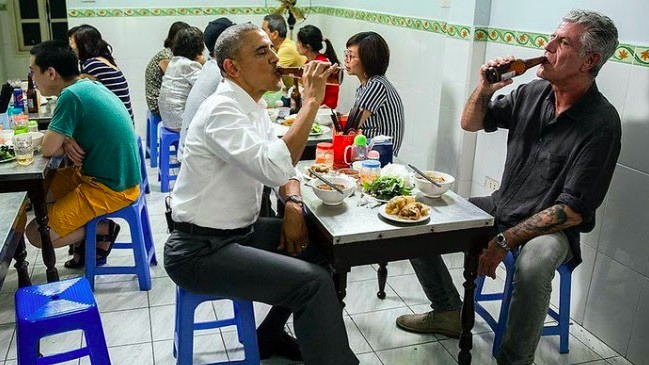Saudade for Sanity: Missing the Rebels in an Echo Chamber of Nonsense
As an America under assault by corruption and complicity faces the hijacking of its democracy by a weaponized reality-show host, some voices of eloquent protest are notable for their absence.

Lisa Van Dusen/For the Hill Times
August 27, 2020
Watching Anthony Bourdain lope his way around Lisbon the other night as a way of re-connecting with a mask-less, unrestricted, pre-pandemic reality, reminded me of just how much his voice is missed during the most globally consequential U.S. election in history.
Bourdain’s globalist, humanist worldview, propensity for asking uncomfortable questions, impulse to side with regular people against corruption and despotism, and habit of expressing inconvenient truths definitely made him stand out against the delicate sensibilities and bullying censorship of the aspiring, chaos-purveying, aspiring new world order.
During an interview in a fado café with António Lobo Antunes, M.D.—novelist, psychiatrist, and, on the eve of his 78th birthday Sept. 1, widely recognized as Portugal’s greatest living writer—the two discussed life under the oppressive, surveillance-entrenched dictat
Before the COVID-19 pandemic further sealed the everything-is-content propaganda universe, social media was our heroin: the 24-hour-per-day mood modulating IV, diversion, distraction, and crutch that makes all developments as tolerable as Candy Crush. Now, the anti-democracy revolution is not only being streamed, the anti-democracy revolution is the heroin—an addictive, largely contrived, perpetual car-crash of nonsense and disbelief. It makes us complicit in the sort of Hollywood-ization of tyranny that would make Leni Riefenstahl blush, that protects bad actors with a focus on the next five minutes instead of the past century and bathes everyone whose future is on the line in a perpetually recalibrated illusion of normalized chaos.
As this previously unthinkable American election approaches its Labour Day homestretch turn, the no-brainer choice—certainly in the eyes of a Rest of the Free World whose future hinges on the outcome—is between the known, sane, democracy-defending, reality-based quantity of Joe Biden and an incumbent whose most overwhelmingly relevant attribute is that he’s willing to steal an election and disregard the will of the people in the geopolitical dateline that is the ultimate trophy of an ongoing totalitarian trophy hunt.
I’m filing this column on the first day of the strangest Republican convention since the last one, i.e. in history, and it will publish after the first two of three nights of that convention have played out on our screens. The Salazarian finale—the improbable spectacle of Donald J. Trump of all people addressing his subjects from the South Lawn of the White House as a morbid inside joke among the thuggish puppeteers running this show—is scheduled for Thursday.
An agitprop extravaganza that absurdly shameless makes you pine—in a downright Portuguese bout of saudade—for the voice of not only Bourdain in our global political echo chamber, but of John McCain and Christopher Hitchens, too. The sort of perspective providers who served as an early-warning system against naked emperors and power-grabbing scams; who were not only familiar with dictators but, in McCain’s case, lived through the substitution of state-sponsored brutality for freedom and so knew the stakes.
The operating philosophy of the interests who’ve deployed Trump as a rationale for America’s particular anti-democratic nightmare in an international rap sheet of them is that, in a world where nothing is unthinkable, anything is possible.
The fact that Barack Obama, as former president of the United States, felt compelled to say of those interests last week, “Don’t let them take away your democracy” was chilling. That wasn’t just more content in the perpetual stream of content; it was a confirmation of the possible. And as a further reminder of how quickly things can change; it was issued four years after he and Bourdain agreed over beers in a Hanoi noodle bar during the last election campaign that it would all turn out okay.
Lisa Van Dusen is associate editor of Policy Magazine and a columnist for The Hill Times. She was Washington bureau chief for Sun Media, international writer for Peter Jennings at ABC News, and an editor at AP in New York and UPI in Washington.
